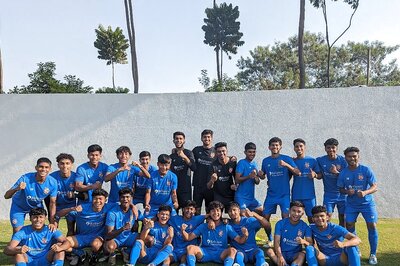
views
Twenty-four-and-a-half years ago, I made a choice to make Delhi my ‘karmabhoomi’ for three chief reasons. It was the capital city of journalism. Compared to other Indian metro cities, it had the widest roads and the maximum green cover.
I also loved the Delhi winter, particularly when the sun came out and one could soak in the sunlight. Year after year, my favourite time of the year in Delhi began on October 1 and continued till the end of February the following year. I looked forward to being outdoor as much as possible during this period. But that was in the past.
Cut to Oct 29, 2019.
My seven-year-old daughter woke up to incessant bouts of cough, which have only marginally reduced in the last six days. She coughs through the night and struggles to find a few winks of sleep. My 74-year-old mother is unwell too, though not as much as her granddaughter. The obnoxious pollutants in the air have got to them as they have to thousands of other Delhi residents in the same age group. The poison in the air harms us all but is most harmful to little children and our senior citizens. The most vulnerable are the homeless who live outdoor 24X7 and those who work in the open for a living,
For those who can afford, leaving the city permanently or during this period may not be practical for a host of reasons. So what is left to do? Suffer and pray things get better soon. We pray because it seems to be the only option. The political establishment is busy shifting the blame and undertakes only a handful of measures that are too little and far too late. The governing authorities do not give it the utmost importance it needs.
If the pollution caused instant deaths triggering a huge toll of lives, perhaps the government would be forced to act. But slow poisoning is a long-term problem and governments don’t care because they live and act in the short-term.
When the citizens ask, what will make our political leaders sit up and adopt emergency remedial measures, the only way I think it is possible is if the citizens have the power round the year to recall our political representatives and the government of the day instead of waiting to exercise their franchise five years after they have last voted. The political class would be forced to act when the public anger is at its peak.
Sadly, Indian democracy does not work that way and the public anger dissipates by the time the next turn to vote presents itself. Politicians also realise that if the voting day falls on either side of the weekend, much of the middle class in Delhi and other big cities would probably view it as an opportunity of a prolonged weekend to leave the city for a short break. So in that way, we the people can’t absolve ourselves of the blame. We don’t assert ourselves when it matters and so the political class doesn’t take us seriously.
In contrast, the farming community is seen as a significant voting block and no government takes any strong measures to alienate this group. So stubble burning will continue in our lifetime unless there is any other technology solution which is affordable. Given the free power, water and other subsidies showered on our farmers, why is it so difficult for the government to directly transfer cash to the account of farmers to encourage them to stop indulging in this practice? Or incentivise them to choose other crops instead of paddy? I am aware stubble burning is not the only cause of pollution but it is the single largest at the moment.
If such is the plight in the capital city of India, what can the rest of India expect? Delhi is the city which is frequented by leaders from other countries. The Federal Chancellor of Germany was here last week and had to suffer the pollution. The Foreign Minister of Finland, a country known for its clean air, is visiting today. Imagine what these diplomats, who have never experienced anything like this, would go through. Why don’t their High Commissioners and Ambassadors in India urge them to avoid travelling in this period? Their visit can always be rescheduled when the air is better. If the visit can’t wait, the meeting can be scheduled in a different city. There have been instances in recent years of world leaders travelling to other Indian cities instead of Delhi.
Why should international cricket matches be held in such polluting conditions? What is the compulsion to put the health of both players and spectators at risk when there is a public health emergency? Surely the venue can be changed to a different city if the match has to take place.
Every country has problems. There is no ideal place to live in. I have no such illusion. We have our share of problems too. Poverty, unemployment, casteism, communalism etc are all real problems our country faces and the citizens have learnt to live with them. However, clean air and water should be the minimum guarantees for citizens. It is fundamental to one’s existence. It affects the lives of one and all. Only if you live can you learn to deal with all other problems. Governments must address this on a war-footing and not rest till it is achieved. All other issues can take a backseat or be accorded lower priority.



















Comments
0 comment